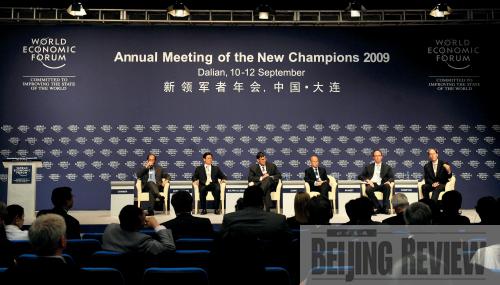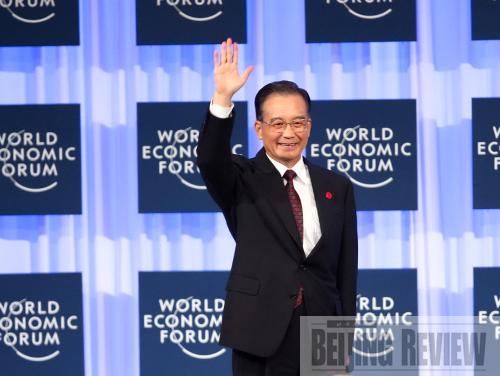|
 |
|
DIAGNOSING RECOVERY: Unprecedented consensus is reached on the role of Asia in getting the global economy to new sustainable growth at Dalian meeting (LI GANG) |
The global economy seems to be on the road to recovery, thanks to massive government stimulus plans worldwide. Yet, uncertainties remain as the stimulus packages will one day be exhausted. Multinational champions looked at the economic fundamentals for a different path to sustainable growth at the World Economic Forum's Annual Meeting of the New Champions held from September 10 to 12 in Dalian, north China's Liaoning Province.
"The world from before the crisis is not coming back," Ben J. Verwaayen, Chief Executive Officer of French telecom equipment supplier Alcatel-Lucent, said while calling for fundamental shifts in business models and government policies. "Consumer demand, rather than international regulation or government stimulus packages, will drive these changes."
While some expressed concerns about potential social backlash caused by unemployment and shrinking welfare, others are looking to new shoots of growth in the coming years.
 |
|
"China's economic rebound is unstable, unbalanced and not yet solid." —Chinese Premier Wen Jiabao at the Summer World Economic Forum in Dalian (DU YANG) | Saying he saw "a light of dawn," China's Premier Wen Jiabao committed to maintaining unprecedented fiscal and monetary measures to secure a recovery from the most severe recession since World War II.
"China's economic rebound is unstable, unbalanced and not yet solid," he said at the opening ceremony of the three-day meeting. "We cannot and will not change the direction of our policies when the conditions are not appropriate."
The meeting attracted about 1,400 business leaders and policy makers from 86 countries and regions.
Demand re-calibration
During panel discussions, many held that the foreseeable withdrawal of stimulus plans would cause bigger challenges to a sustained recovery to surface.
"We are starting to see some recovery of the global economy but it is important to maintain the stimulus programs that have stopped the decline and laid a foundation for a return to solid growth," David Dollar, former World Bank country director for China and Mongolia and current U.S. Economic and Financial Emissary to China told Beijing Review.
"China's growth is already back to a healthy level of 8 percent or more, but forecasts for the developed economies indicate that they will grow in 2010 but relatively slowly," Dollar said.
Zhu Min, Executive Vice President of the Bank of China, said the infrastructure construction plan can support next year's growth. "We are confident of achieving an 8-percent GDP growth or more, but a lower GDP growth and a more solid economic recovery is better for all," he said.
Zhu mentioned three predominant challenges to China's industries: getting China's manufacturing to the high added-value end and switching to a domestic consumption-driven growth, while adapting to a low-carbon business environment.
During a panel on the global economic outlook, Stephen Roach, Chairman of Morgan Stanley Asia, inquired about what would replace the stimulus plan on the demand side once it is exhausted since such a large-scale plan has never been implemented before. As Roach pointed out, no other country can replace the United States as the world's largest consumer—U.S. private consumption was $10 trillion last year versus $1.5 trillion in China.
"The American consumer is dead and this is a wake-up call for the Chinese and Asian export industry," Roach said. U.S. household saving rates have reached 6.9 percent in May, a 15-year high, from zero in April 2008.
"In the next period we will not see as rapid a growth of U.S. consumption as in the past decade because it will take some years for households to rebuild their wealth," Dollar said. "China, Germany, and Japan together have about the same level of consumption as the United States. It is important for these three surplus economies to stimulate domestic demand. That will help the world economy grow well again, but in a more balanced fashion than we saw in the past decade."
Still, some time will be necessary for consumer habits to shift gears. "It may take six to seven years for Chinese consumers to shift from saving to buying, not because people feel they have to save for emergencies, but also because the country's social security network is weak," said Liu Jiren, Chairman and CEO of Neusoft Corp.
According to Roach, realizing a balanced and sustainable growth was a more critical concern than dealing with the risk of deflation and inflation for China.
"For China, the biggest challenge to a sustained recovery is to stimulate domestic consumption, while for the United States, it is to follow through on the financial sector reforms and healthcare reforms proposed by the [Obama] administration," Dollar said.
"On the fiscal side, two thirds of the U.S. deficit is related to the economic downturn, so as the U.S. economy starts to recover, the deficit will decline. Other measures, such as healthcare reform, will help with longer-term fiscal sustainability," he said.
| 